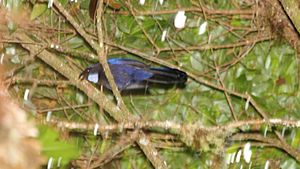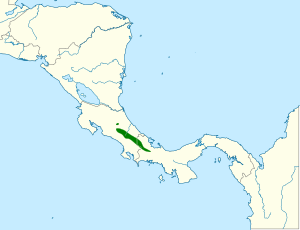Silvery-throated jay facts for kids
Quick facts for kids Silvery-throated jay |
|
|---|---|
 |
|
| Conservation status | |
| Scientific classification | |
| Genus: |
Cyanolyca
|
| Species: |
argentigula
|
 |
|
The silvery-throated jay (scientific name: Cyanolyca argentigula) is a beautiful bird that belongs to the Corvidae family, which also includes crows and magpies. You can find this special bird living in the cool, misty Talamancan montane forests of Costa Rica and western Panama. Experts from the IUCN say that this bird is a "least concern" species, meaning it is not currently in danger of disappearing.
Contents
What Does the Silvery-throated Jay Look Like?
The silvery-throated jay is a unique and small jay bird. It's easy to spot because it doesn't look like any other bird in its home area. Both male and female jays look very similar. An adult bird is about 26 centimeters (10 inches) long, and that includes its long tail.
Head and Body Colors
Its head is black, but it has a clear, narrow white stripe above its eyes, called a supercilium. On its forehead, it has a small crest of short, stiff feathers. The throat and chest of the bird are a shiny silvery-white, sometimes with a hint of purple.
The back of its neck and sides of its chest are black. This black color slowly changes into a dark purplish-blue over the rest of its body. The top parts of its wings and tail are a brighter, lighter blue. The undersides of its wings are blackish.
Eyes, Beak, and Legs
The eyes of the silvery-throated jay are a deep red color. Its beak and legs are both black. Young jays have duller colors and do not have the white markings on their heads.
How Silvery-throated Jays Live
The silvery-throated jay is a very social bird. It likes to move through the tops of the forest trees in groups of four to ten birds. When it's not breeding season, these groups can get even bigger, sometimes up to thirty jays! They often sleep together in large groups, making a lot of noise before settling down for the night.
What They Eat
When looking for food, these jays carefully search through the tree branches. They look in cracks and poke into mosses, lichens, and other plants that grow on trees, called epiphytes. Their diet includes insects and other small creatures without backbones, like invertebrates. They also eat amphibians, lizards, fruit, and berries.
Life Cycle and Reproduction
The breeding season for the silvery-throated jay is from March to June. However, not much is known about their nests or their eggs. Scientists are still learning about how these birds raise their young.
Where Silvery-throated Jays Live and Their Status
The silvery-throated jay lives in Costa Rica and Panama. It prefers moist cloud forests, which are high up in the mountains. You can find them at altitudes between 2,000 and 3,200 meters (6,600 to 10,500 feet).
This bird is not very common. The total area where it lives is quite small, about 3,900 square kilometers (1,500 square miles). Even though their living space is small, the number of these birds seems to be steady. Because of this, the International Union for Conservation of Nature has listed its conservation status as "least concern". This means they are not currently at risk of becoming endangered.
Images for kids
See also
 In Spanish: Chara gorjiplateada para niños
In Spanish: Chara gorjiplateada para niños




